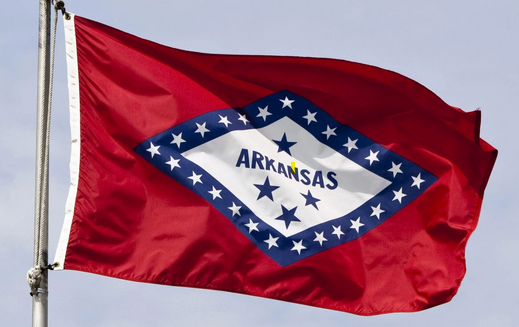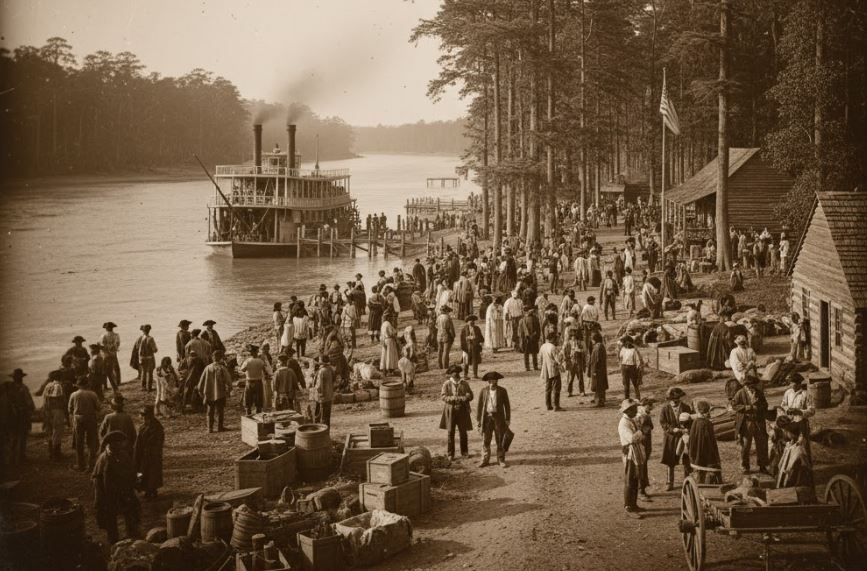Let's explore the names and historical phases that shaped Arkansas before its statehood.
Land of the Quapaw and Other Nations
For thousands of years, the land that would become Arkansas was home to numerous Native American peoples. These diverse groups lived along its rivers, hunted in its forests, and farmed its fertile lands.
The state's name, "Arkansas," has indigenous origins, though it entered English through French translation. It is derived from a Quapaw (Akansea) word, which French explorers transliterated as "Arkansa" or "Arkansas." The Quapaw were a Dhegiha Siouan-speaking people, and their name for themselves was "Ugakhpa," meaning "downstream people." The Illinois, allies of the French, used a similar term for the Quapaw, which the French then adopted.
Other prominent tribes in the region included the Caddo in the southwest, and parts of eastern Arkansas were also within the traditional territories of the Osage and Tunica peoples.
French Louisiana: Louisiane
The first Europeans to explore the Arkansas region were the Spanish, most notably Hernando de Soto in the 1540s. However, they did not establish any permanent settlements.
It was the French who laid the groundwork for European presence. In 1673, Father Jacques Marquette and Louis Jolliet explored the Mississippi River, reaching the mouth of the Arkansas River. A few years later, in 1682, René-Robert Cavelier, Sieur de La Salle, claimed the entire Mississippi River Valley for France, naming it "Louisiane" (Louisiana) in honor of King Louis XIV.
In 1686, La Salle's lieutenant, Henri de Tonti, established Arkansas Post near the mouth of the Arkansas River. This was the first permanent European settlement in the lower Mississippi Valley and served as a trading post, military installation, and a point of contact with the Quapaw. For over a century, the land that would become Arkansas was considered part of vast French Louisiana.
Spanish Louisiana (Luisiana)
Following their defeat in the French and Indian War (Seven Years' War), France secretly ceded Louisiana to Spain in the Treaty of Fontainebleau (1762) to prevent it from falling into British hands. This transfer was formalized in the Treaty of Paris (1763).
Thus, from 1762 to 1800, the Arkansas region was part of Spanish Louisiana (Luisiana). Spanish administration was generally light, with Arkansas Post continuing to function as a remote trading outpost.
The Louisiana Purchase: District of Louisiana / Louisiana Territory
In a swift and pivotal move, Spain returned Louisiana to France in 1800, under Napoleon's pressure. Just three years later, in 1803, Napoleon sold the entire territory to the United States in the Louisiana Purchase. This massive acquisition doubled the size of the young American nation and brought Arkansas under U.S. control.
Initially, the northern part of the Louisiana Purchase, including Arkansas, was organized as the District of Louisiana (1804-1805), which was administered as part of the Indiana Territory. From 1805 to 1812, it became the Louisiana Territory, and then from 1812 to 1819, it was part of the Missouri Territory.
The Arkansas Territory (1819-1836)
As American settlements pushed westward, particularly after the War of 1812, the need for a separate administrative unit became clear. On March 2, 1819, Congress officially established the Arkansas Territory. This territory initially included not only present-day Arkansas but also a significant portion of what would become Oklahoma.
Arkansas Post served as the first territorial capital, but it was later moved to Little Rock in 1821 due to its more central location. The territorial period was marked by increasing conflicts with Native American tribes (who were gradually removed from their lands), the expansion of cotton cultivation, and the establishment of steamboat routes on the Arkansas and Mississippi rivers.
Statehood
With a growing population and evolving infrastructure, the Arkansas Territory began its push for statehood. A constitutional convention was held in 1836, and a state constitution was drafted.
 On June 15, 1836, President Andrew Jackson signed the bill admitting Arkansas to the Union as the 25th state. The name "Arkansas," deeply rooted in its indigenous past and French exploration, was retained for the new state.
On June 15, 1836, President Andrew Jackson signed the bill admitting Arkansas to the Union as the 25th state. The name "Arkansas," deeply rooted in its indigenous past and French exploration, was retained for the new state.



